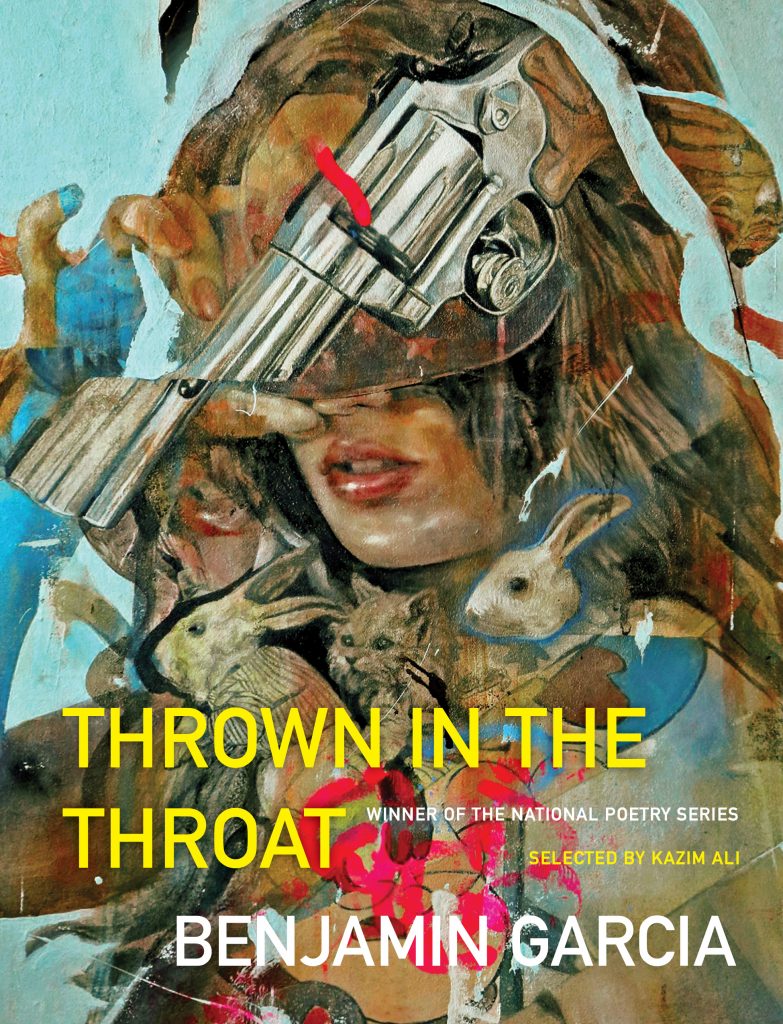
REVIEW BY GABINO IGLESIAS
—
Benjamin Garcia’s Thrown in the Throat is one of those rare poetry collections that isn’t satisfied with tackling one important subject. Between growing up undocumented and processing the complexities of queer identity (“mom didn’t know I was gay/because she chose not to see”), this is a superb debut that explores identity in a variety of ways and heralds the arrival of a powerful new voice in contemporary poetry.
Garcia does a lot of things right, but there are three elements that merit discussion. The first is the use of Spanish. This is a collection that brings together being and belonging. Garcia is part Santa Muerte and part Marilyn Monroe, and the mix of languages echoes. In these poems, the use of Spanish is deliberate, a great reminder that sometimes usamos una palabra porque es la mejor palabra para esa oración o sentimiento y no porque no sabemos la traducción de ella. Y que conste: “If some words don’t belong in poems, then/I say some people can go fuck themselves.”
The second element, which is incredibly timely, is existence between cultures, in the interstitial space that is home to all migrants:
When our mothers had no water for themselves?
we drank. When we had no bed we mapped a plot
in the dirt. We had to lie in the dirt of your country.
When we had no money we worked.?
When we had no license we walked.?
When we had no strength our mind kept walking.
When we had no passport our blood?
was our passport. When there was no train
we hauled the weight of our own body.
When we had no companion we remembered
God is our companion. When we had no
direction our family was our compass.
When we had no faith luck?
was our faith. When we have finished
death will be our luck.
Undocumented is our status, resistance
is our cause. Because we cannot sleep
we dream with open eyes.
Garcia explores family, poverty, love, queerness, and trauma through language. At once playful and precise, the writing in Thrown in the Throat operates on two levels. In the first, the words tell stories, explore memories, and chronicle important events. In the second, language is a vehicle for rhyme and rhythm, with cadence and alliteration popping up from time to time to remind readers that Garcia is in control at all times and that the way they’re reading the poem obeys the way the poet crafted it.
Of all the elements mentioned above, playfulness is perhaps the strongest and the least expected. Garcia has a sense of humor, and it dances with trauma and bad memories in this collection. The reader always stands on shaky ground, expecting a reversal, an explosive line, a shattering revelation, or a devastating truth, and Garcia constantly delivers. Here’s the first part of “The Great Glass Closet”:
“This is not a metaphor: when I say that I lived in the closet, it’s because I lived in the closet.
You might, too, if you shared a one-bedroom apartment with eleven other people and a pet: mother, stepfather, brother, brother, brother, uncle, aunt, cousin, cousin, cousin, cousin, dog. Then there’s me, the surplus.
You could have called our closet a walk-in closet in the sense that a child’s body could walk in. Mine did, and I called it home. It was comfortable enough, if you were willing to lie. I was.”
Thrown in the Throat packs a life and unpacks an identity. Navigating smoothly through the rocky terrain of immigration and Otherness, Garcia’s poems are declarations that stick to your ribs and convince you that you know the person behind the words because something so strong and personal can’t click with you so quickly unless there is some kind of kinship. This is a debut all poetry lovers should read, and then join in me in eagerly waiting for whatever Garcia does next.
—
Gabino Iglesias is a writer, editor, literary critic, and professor living in Austin, TX. He is the author of ZERO SAINTS and COYOTE SONGS. You can find him on Twitter at @Gabino_Iglesias.
![[PANK]](https://pankmagazine.com/wp-content/themes/pank/assets/images/pank-logo-large.png)
